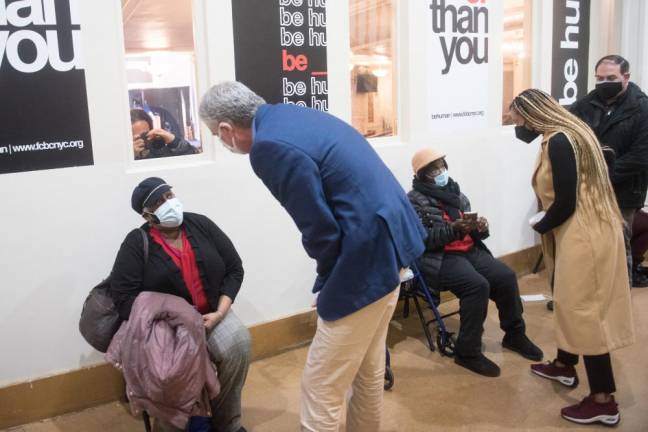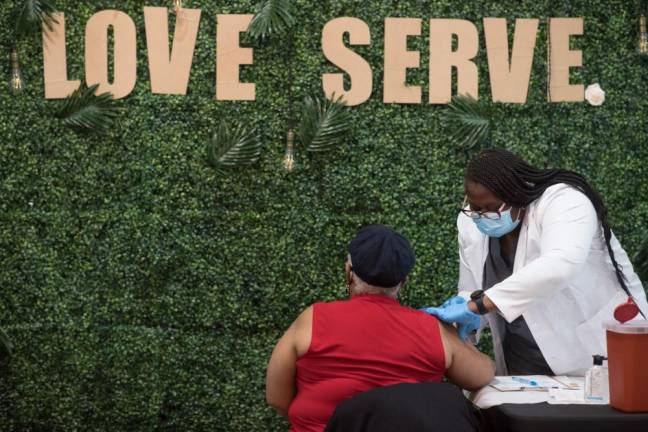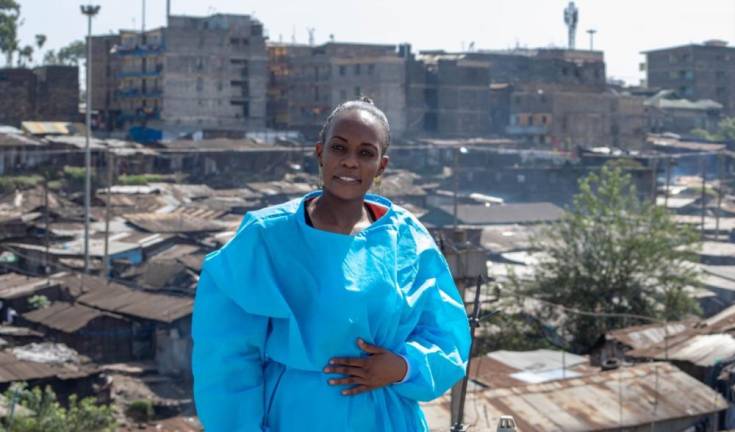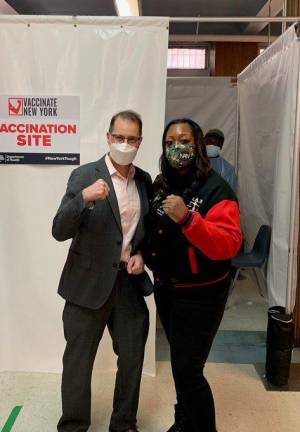Something has been missing from our conversation about equity and ending the pandemic. Or, if it is easier to visualize, someone has been missing.
Her name is Emma Ingaiza. She is a single mom and frontline health worker, who runs an urban clinic for very low income residents, all people of color. For a year now, she and her colleagues have fought the pandemic with little more than inadequate protective equipment and their own most creative efforts to isolate and quarantine patients in their densely crowded community.
Emma herself was flattened by COVID-19 last November. She still shudders about the worst moments, when she started hallucinating. “The thought of dying is so much on your mind,” She said. “I would feel like, ‘I’m not going to make it’. So it’s not only a physical disease.”
Much of this probably sounds sadly familiar by now. But one detail sets Emma’s story apart. More than two months after a nurse in Queens became the first American to be vaccinated outside a clinical trial, neither Emma nor her fellow health workers nor any of their patients have received a single dose.
In fact, no one in her entire nation, Kenya, has received any vaccine.
The inequity is hard to miss. “We would want the world out there to understand that we are equally important,” Emma said from Nairobi, where she manages a health clinic in the legendary slums of Mathare. “That our lives also matter. We’re just on the front line as much as everyone else is, and it would be very relevant and important for equity to apply. I do not think that other countries are more important than Africa.”
As vaccine supply increases in the United States, New York’s leaders say they are all about equity in distribution. No one is safe until we are all safe has become a mantra. Pop-up sites at the Convent Avenue and First Corinthian Baptist Churches vaccinated several hundred Harlem residents in the past few days. “This proves the power of local vaccination sites in trusted venues,” said Council Member Mark D. Levine, chair of the health committee. “We need this everywhere.”
By everywhere, Levine means everywhere in New York. Our definition of equity has not stretched much beyond the borders of the great city. We pore over ZIP code maps of the five boroughs for disparity and protest when some of the city’s vaccine ends up in an arm from Westchester.
But Emma Ingaiza reminds us that this is a global pandemic, a lesson New Yorkers learned the hard way almost exactly a year ago when the coronavirus slipped in from Europe while everyone was watching China.
Coverage of Variants
The hard reality is that the recovery of New York is deeply dependent on the world’s recovery.
First, of course, so long as SARS-Cov-2 is spreading and mutating anywhere there is a risk of resurgence anywhere.
News coverage about variants outstripped the immediate danger last week. “A new form of the coronavirus is spreading rapidly in New York City, and it carries a worrisome mutation that may weaken the effectiveness of vaccines,” The New York Times alerted its readers Wednesday.
“Pathogen porn isn’t helping public health,” Dr. Jay Varma, Mayor Bill de Blasio’s health adviser, replied on Thursday. The variant is a cause for interest, not panic, he said.
Nevertheless, the transcendence of the virus over borders is well illustrated by the public practice, against all advice from global health officials, to identify variants by the place they were first identified, such as South Africa, United Kingdom, Brazil, California and, of course, China. This goes back to the Spanish flu, which most likely originated in Kansas. There is no word yet whether our new local variant, officially B.1.526, will become the New York, Manhattan or Washington Heights variant.
There are few communities more integrated into the global economy than New York, which means our financial recovery is directly tied to the recovery of business travel, global trade, tourism and migration.
Before the pandemic the state labor department described leisure and hospitality as among the largest and fastest growing significant industries in the city. “New York City’s growing popularity as a tourist destination combined with the adoption of dynamic pricing models by hotels has created a steady stream of new hotel openings as well as increased the number of job opportunities in the sector,” the department reported in 2019.
Today the only dynamic pricing is hotels charging the city and the federal government to shelter homeless New Yorkers. The owners of other hotels are looking for opportunities to convert them to long-term housing, offices or other uses.
Leisure and Hospitality Jobs
Of the 560,000 jobs destroyed by the pandemic, two-thirds were in leisure and hospitality, which along with restaurants, bars and hotels also includes theater, sports and other events.
Those jobs won’t come back until people come back - from all over the world. They are unlikely to come back until they feel the pandemic is well under control.
Governor Andrew Cuomo has begun approving partial re-openings, like basketball with “crowds” at ten percent capacity. On Friday, he added hotel workers to his growing list of those eligible to be vaccinated.
This may please local team owners and hotel union leaders. But ultimate recovery will be shaped by choices made beyond the city’s borders and, in that sense, beyond the reach of our own leaders, who, in truth, are being judged almost entirely by how well they protect their own citizens.
Advocates have come up with the phrase “vaccine nationalism” to describe how rich countries are securing their own vaccine supplies before helping others. President Biden pledged $4 billion the other day to buy vaccine for poor countries, but the White House made clear he wasn’t proposing to part with any current supply.
The World Health Organization had a plan for this. It is called COVAX, a program in which rich countries would put up the cash to buy vaccine for poor countries. That is where President Biden was sending the $4 billion.
The problem is that this money doesn’t go very far if there is not much vaccine to buy. The same countries that send money to COVAX have also bought up most of the vaccine supply. In fact, COVAX made its first delivery of vaccine last week, to Ghana and the Ivory Coast.
What is true of Presidents is true of Mayors and governors, too. Perhaps call it Vaccine statism? Or just provincialism? Cuomo, besieged by allegations that he mishandled coronavirus in the state’s nursing homes and then concealed the death toll, was also fending off allegations Friday of unequal vaccine distribution.
“This inequity,” the governor promised, will be “immediately addressed.”
His commitment was not to Emma Ingaiza in Kenya, however. He was responding to complaints from Democratic legislators in the Bronx.
GlobalGoalsCast.org collaborated in the reporting of this story.



